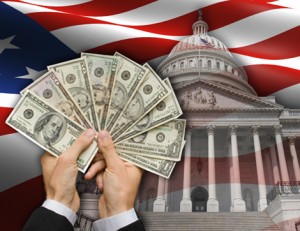NOVANEWS
AFP
 Powerful alien interests using loopholes in U.S. election laws to influence presidential race
Powerful alien interests using loopholes in U.S. election laws to influence presidential raceBy Keith Johnson
Should a government of the people, by the people and for the people allow foreign-ownedcorporations to have a say in U.S.politics? Like it or not, that’s precisely what’s happening in America. Thanks to loopholes in campaign finance laws, groups aligned with candidates from both major political parties have been raking in millions of dollars in contributions from a variety of multinational companies headquartered outside the United States.
On October 5, the Center for Public Integrity reported that “Restore Our Future,” the superPAC supporting Mitt Romney’s run for president, received a $1M donation in mid-August from reinsurance company OdysseyRe of Connecticut, a ‘wholly owned subsidiary’of Canadian insurance and investment management giant Fairfax Financial Holdings Unlimited.”
Due in large part to vague language in the Supreme Court’s controversial 5-4 Citizens United ruling, foreign contributions to political action committees (PACs) are legal as long as foreign nationals are not part of the decision-making process. Existing laws dictate that only American citizens and immigrants with green cards are allowed to contribute to federal politics. However, American divisions of foreign companies can form PACs and collect contributions from their American employees.
As such, spokesmen from OdysseyRe and Fairfax Financial insist that they broke no U.S. laws since their firm’s contribution was executed by a subcommittee of U.S. nationals who sit on the company’s board of directors.
Fortunately, at least one politician has raised concerns about foreigners exploiting loopholes in existing law to influence U.S. elections.
“You can bet that wholly owned subsidiaries of foreign commercial entities have an agenda when they spend millions to sway the outcome of an election,” said Sen. Sheldon Whitehouse (D-R.I.). “And you can bet that agenda is not promoting the interests of middle-class American voters.”
Although OdysseyRe’s sizable contribution has sparked considerable controversy in recent days, it is only a fraction of what has been pouring into the coffers of GOP and Democratic campaigns from international donors. According to data collected by the Center for Responsive Politics (CRP), $12,848,813 has been raised so far this year from foreign-connected PACs. Democrats received $5,322,517, while Republicans took in $7,526,296.
Anheuser-Busch, which was acquired in 2008 by Belgian-Brazilian brewing company InBev, stands out as one of the largest contributors in 2012, channeling a whopping $641,110 to groups aligned with political candidates from both major parties, who do their bidding on Capitol Hill. Contributions were almost evenly split between Democrats and Republicans—but none to third parties. In fact, Anheuser-Busch was the major sponsor of the lastpresidential debate, which deliberately excluded candidates from the Green, Libertarian and Constitution parties.
Of the top 50 most influential foreign-controlled PACs, CRP reports that 14 have parent companies based in London, making it the largest overseas source of campaign money. According to a recent article in The Observer, “Among the industries already well versed in bankrolling U.S. politics are finance, pharmaceuticals, energy and defense. British multinationals such as HSBC, Barclays, Experian, Prudential, Glaxo-SmithKline, AstraZeneca, BP, Shell and BAE all have political action committees that channel donations from employees to U.S. politicians.”
Though Democrats have received their fair share, Republicans are by far the biggest recipients of money from the UK. Of these British multinationals, BAE Systems, one of the world’s largest private military firms, was the biggest UK spender in 2012, with $372,250 out of a total of $609,750 going to Republican candidates. The scope of the company’spolitical influence was demonstrated in November 2011 when GOP presidential candidate Mitt Romney spoke before a group of BAE employees and proposed abolishing the federalMedicare program in order to prevent $600M in cuts to the defense budget over the course of the next 10 years.
HSBC Holdings, one of the world’s largest banks, is another major UK contributor to the Republican Party, giving the lion’s share of their $170,500 to various GOP PACs. HSBC is currently being investigated by the Justice Department for laundering $7B in Mexican drug cartel money between 2007 and 2008.
Experian, a global credit information group that maintains files on 215M American consumers, contributed 78% of $320K in donations to GOP PACs during 2012. This isn’tsurprising. Experian’s parent company, Great Universal Stores, acquired the credit giant through a deal that was orchestrated by Romney while he worked as a management consultant for Bain Capital in 1996.
Foreign corporations are also buying influence via “bundled” contributions collected by their U.S. registered lobbyists. According to CRP, Patrick Durkin, Sr., a lobbyist for British banking giant Barclays, has personally contributed $532,143 and bundled $1,111,790 from other donors for Romney’s 2012 presidential campaign.
Campaign watchdog group Think Progress reports: “Romney’s lobbyist-bundler list also includes Ignacio E. Sanchez ($86,700) of DLA Piper, a registered foreign agent for the United Arab Emirates and a presidential candidate in the Dominican Republic.”



